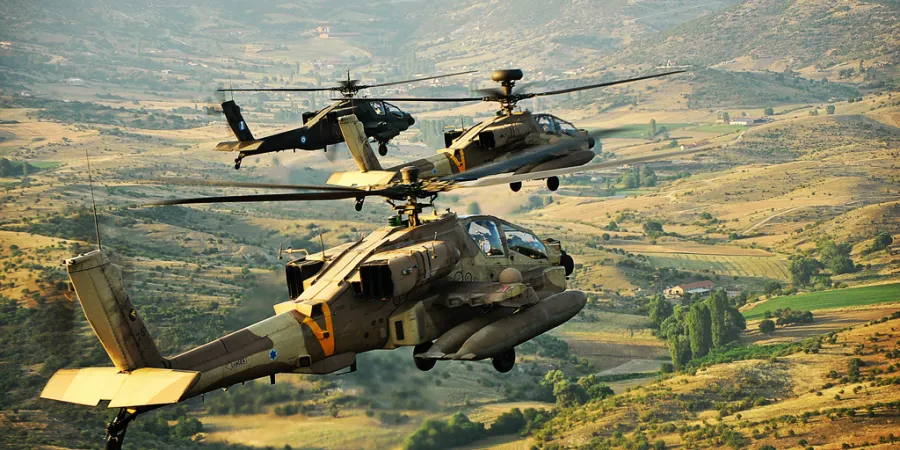IAF Grounds Apache Fleet after Fatal Crash
An IDF Apache helicopter crashed in southern Israel during a training mission, killing one pilot and critically injuring the second. The accident comes two months after the entire Apache fleet was grounded over safety concerns
IsraelDefense
| 08/08/2017
An Apache attack helicopter crashed near the Ramon Air Force base in southern Israel on Monday with two crewmembers inside. One pilot was killed and the other was seriously injured. The pilots were on their way back to the base after a training flight when a technical malfunction was reported around 9 PM. According to the IDF spokesperson, the helicopter crashed near the landing pad at the base.
Following the crash, the Israeli Air Force (IAF) has grounded its fleet of Boeing AH-64 Apache attack helicopters. The grounding order has been placed on the IAF's entire attack helicopter division until the investigation into the incident at Ramon Air Force Base is completed. Representatives from Apache's American manufacturer Boeing are also expected to join the investigation into the cause of the crash.
The army's Apache helicopters were only re-commissioned in July after the discovery of a large crack in the back rotor blade of one of the helicopters in June saw the IAF's two Apache squadrons grounded and subjected to inspection. In late July, an Apache made an emergency landing in the West Bank after the pilot reported vibrations in the back of the aircraft.
However, The preliminary findings of the investigation into a deadly Apache helicopter crash have indicated that there was no connection between the crash and the reason behind the grounding of the entire fleet earlier this summer.
According to a senior Air Force officer, the "thorough, microscopic, and intensive" investigation, which was carried out by the IAF along with the Boeing as well as the US army, revealed that a crack developed due to material fatigue after two thousand hours of flight. They also discovered a different crack in another area of the helicopter. The Air Force, therefore, decided to shorten the life of the blades by 80% from 4,600 hours to 995 flight hours.
The IAF said it would also perform an X-ray test for all Apache blades and have already finished checking over 40 blades. It also stated that it would continue its strict policy of maintenance by technicians who check the helicopter before each flight as well as after every 50 hours of flight.
The IAF received the first of its 42 AH-64A 'Peten' helicopters in 1990 (24 remain in service), with deliveries of 21 AH-64D 'Saraf' platforms commencing in 2005 (of which 20 remain). Originally acquired to augment the Bell AH-1E/F Cobra ('Tsefa' in IAF service), the Apache became Israel's sole attack helicopter in late 2013 when the Cobras ended operations after more than 30 years of service.
An IDF Apache helicopter crashed in southern Israel during a training mission, killing one pilot and critically injuring the second. The accident comes two months after the entire Apache fleet was grounded over safety concerns
An Apache attack helicopter crashed near the Ramon Air Force base in southern Israel on Monday with two crewmembers inside. One pilot was killed and the other was seriously injured. The pilots were on their way back to the base after a training flight when a technical malfunction was reported around 9 PM. According to the IDF spokesperson, the helicopter crashed near the landing pad at the base.
Following the crash, the Israeli Air Force (IAF) has grounded its fleet of Boeing AH-64 Apache attack helicopters. The grounding order has been placed on the IAF's entire attack helicopter division until the investigation into the incident at Ramon Air Force Base is completed. Representatives from Apache's American manufacturer Boeing are also expected to join the investigation into the cause of the crash.
The army's Apache helicopters were only re-commissioned in July after the discovery of a large crack in the back rotor blade of one of the helicopters in June saw the IAF's two Apache squadrons grounded and subjected to inspection. In late July, an Apache made an emergency landing in the West Bank after the pilot reported vibrations in the back of the aircraft.
However, The preliminary findings of the investigation into a deadly Apache helicopter crash have indicated that there was no connection between the crash and the reason behind the grounding of the entire fleet earlier this summer.
According to a senior Air Force officer, the "thorough, microscopic, and intensive" investigation, which was carried out by the IAF along with the Boeing as well as the US army, revealed that a crack developed due to material fatigue after two thousand hours of flight. They also discovered a different crack in another area of the helicopter. The Air Force, therefore, decided to shorten the life of the blades by 80% from 4,600 hours to 995 flight hours.
The IAF said it would also perform an X-ray test for all Apache blades and have already finished checking over 40 blades. It also stated that it would continue its strict policy of maintenance by technicians who check the helicopter before each flight as well as after every 50 hours of flight.
The IAF received the first of its 42 AH-64A 'Peten' helicopters in 1990 (24 remain in service), with deliveries of 21 AH-64D 'Saraf' platforms commencing in 2005 (of which 20 remain). Originally acquired to augment the Bell AH-1E/F Cobra ('Tsefa' in IAF service), the Apache became Israel's sole attack helicopter in late 2013 when the Cobras ended operations after more than 30 years of service.



